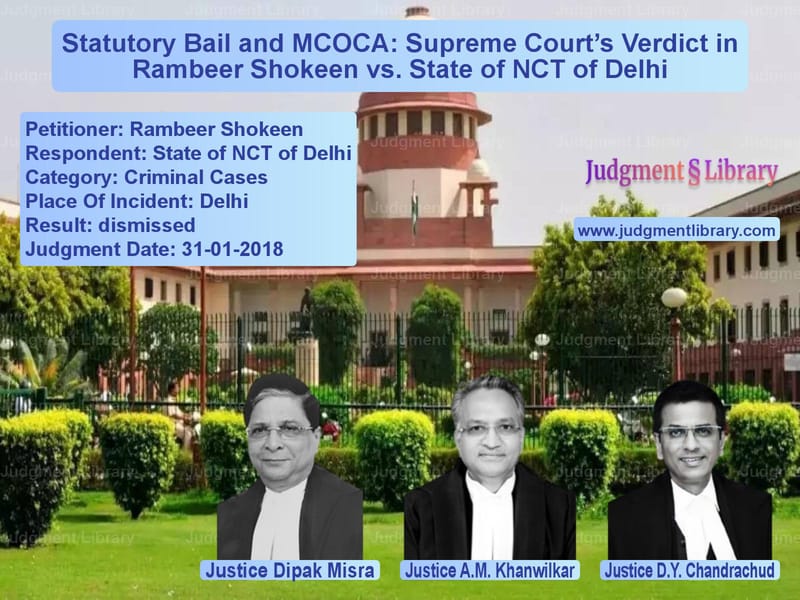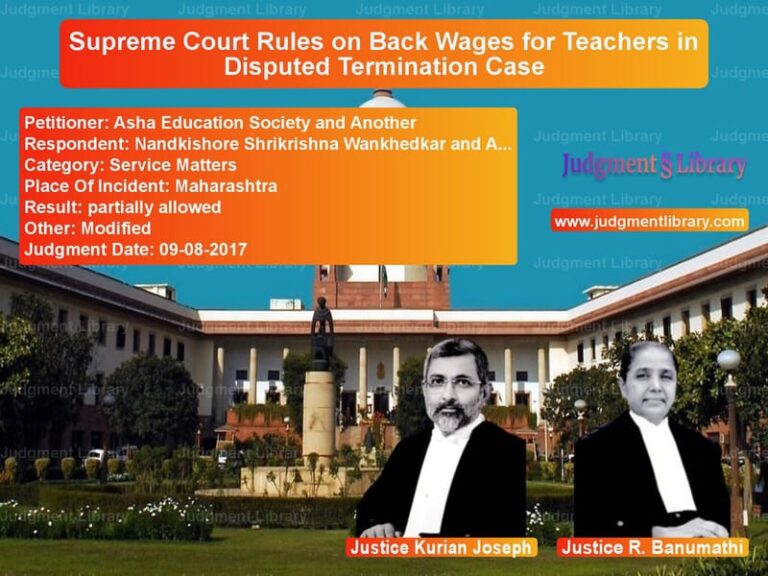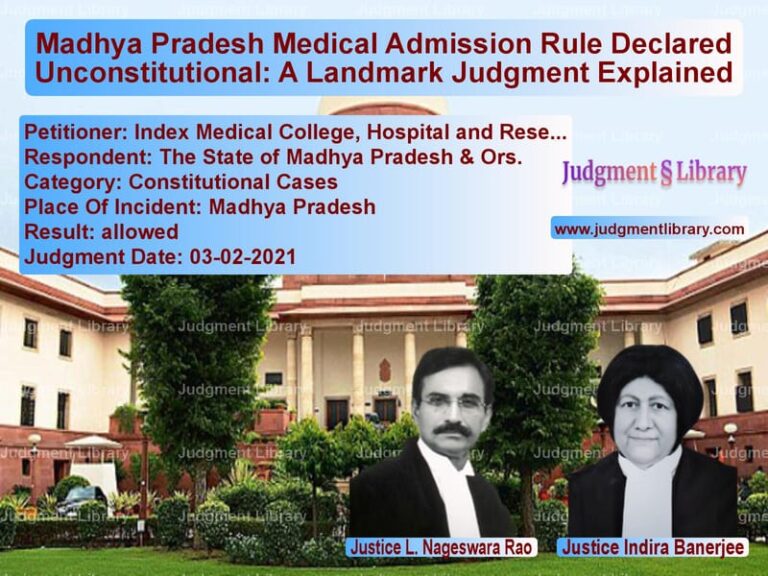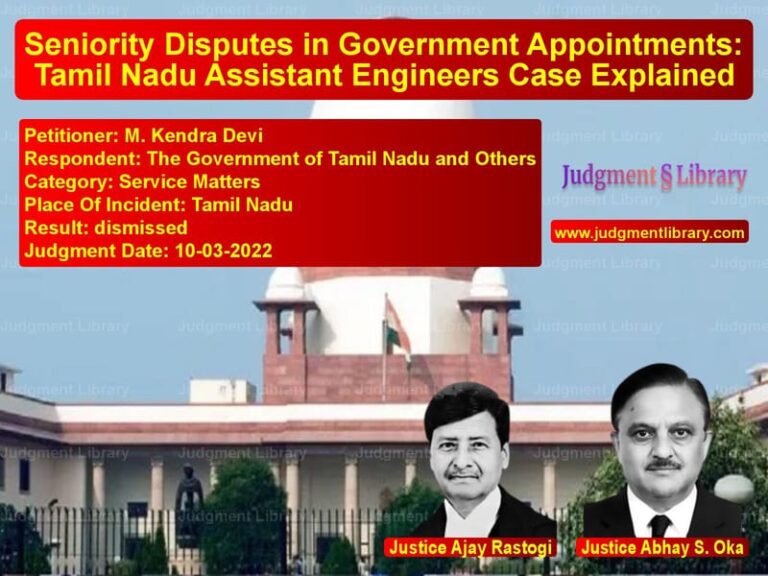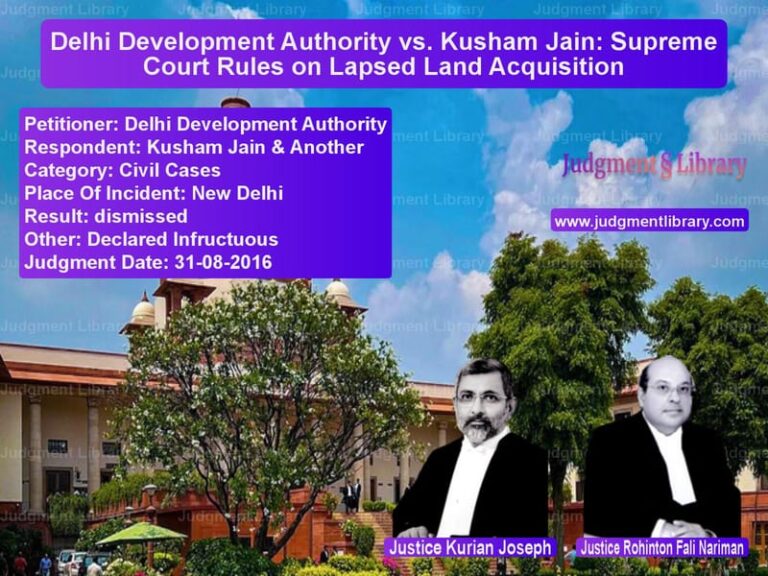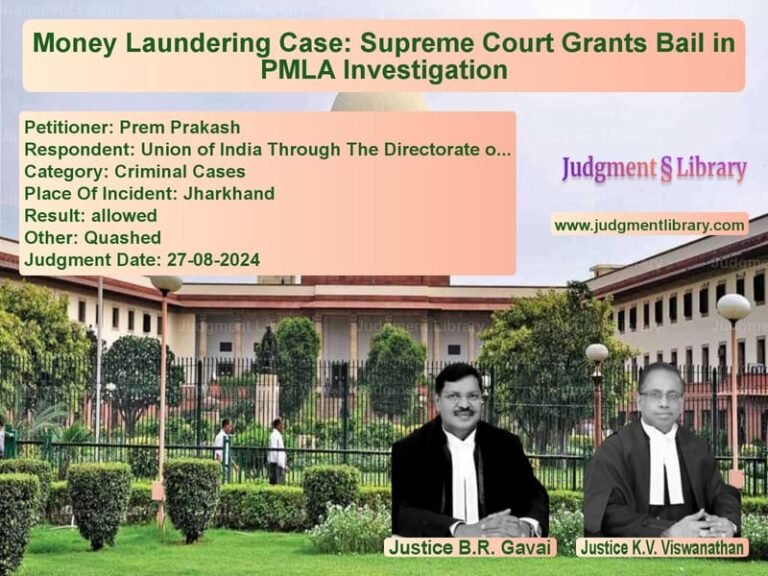Statutory Bail and MCOCA: Supreme Court’s Verdict in Rambeer Shokeen vs. State of NCT of Delhi
The case of Rambeer Shokeen vs. State of NCT of Delhi is a landmark judgment on the interpretation of statutory bail under Section 167(2) of the Code of Criminal Procedure (Cr.P.C.), particularly in cases under the Maharashtra Control of Organized Crime Act, 1999 (MCOCA). The Supreme Court addressed whether an accused could claim an indefeasible right to bail if the prosecution sought an extension of time for filing the charge sheet but the court did not expressly rule on the request before the charge sheet was filed.
Background of the Case
Rambeer Shokeen was arrested in connection with FIR No. 10/2015, registered under Sections 3 and 4 of MCOCA, for allegedly running an organized crime syndicate. He was also booked under the Arms Act in a separate case. After evading arrest for a prolonged period, he was declared a proclaimed offender before being apprehended on December 1, 2016.
The legal issue arose when the statutory period of 90 days for filing the charge sheet was about to expire. On February 28, 2017, the Additional Public Prosecutor filed a request seeking an extension of time until March 15, 2017, to file the charge sheet. Meanwhile, Shokeen moved an application for statutory bail under Section 167(2), claiming that the prosecution had failed to file the charge sheet within the prescribed period.
Key Legal Issues
- Whether the accused acquires an indefeasible right to bail if the court does not expressly extend the time for filing the charge sheet before the statutory period expires.
- Whether a pending application for extension of time to file the charge sheet can override a plea for statutory bail.
- Interpretation of Section 167(2) Cr.P.C. read with Section 21(2)(b) of MCOCA.
Arguments by the Parties
Arguments by the Petitioner (Rambeer Shokeen)
- The prosecution failed to obtain an express extension of time before the expiry of 90 days.
- Since no order was passed on the prosecution’s request, his right to statutory bail became indefeasible.
- Filing of the charge sheet on March 8, 2017, did not extinguish his right to bail, as he had applied before that.
- He relied on the decisions in Hitendra Vishnu Thakur vs. State of Maharashtra and Uday Mohanlal Acharya vs. State of Maharashtra.
Arguments by the Respondent (State of NCT of Delhi)
- The Additional Public Prosecutor had filed an application for extension of time before the expiry of 90 days.
- The court had extended judicial custody from February 28 to March 8, pending a decision on the extension request.
- The prosecution was not at fault for the delay in deciding the application for extension.
- As per the Constitution Bench ruling in Sanjay Dutt vs. State through CBI, an accused loses the right to statutory bail if the charge sheet is filed before bail is granted.
Supreme Court’s Observations
On the Maintainability of the Bail Application
- “No right can be said to have accrued to the accused for grant of statutory bail before the charge sheet was filed.”
- “The prosecution had already moved an application for extension of time, and the court had extended judicial custody.”
On the Effect of Filing the Charge Sheet
- “Once the charge sheet is filed, the custody of the accused is not governed by Section 167 Cr.P.C. but by other provisions of the Code.”
- “Even if an accused applies for bail under Section 167(2), his right is extinguished the moment the charge sheet is filed.”
On Judicial Discretion
- “The judicial delay in deciding the application for extension cannot be used against the prosecution.”
- “In cases under MCOCA, where organized crime is involved, strict compliance with procedural safeguards must be balanced with public interest.”
Key Precedents Cited
- Sanjay Dutt vs. State through CBI (1994): “An accused’s right to statutory bail ceases when the charge sheet is filed.”
- Uday Mohanlal Acharya vs. State of Maharashtra (2001): “If an accused applies for bail before the charge sheet is filed, the right is enforceable.”
- Nirala Yadav vs. State of Bihar (2014): “Courts should decide applications for extension of time promptly to avoid unnecessary litigation.”
Supreme Court’s Final Judgment
The Supreme Court upheld the decision of the High Court and ruled:
- The application for extension of time was filed within the prescribed period, and the accused was under judicial custody.
- The judicial delay in ruling on the extension request did not create an automatic right to bail.
- The charge sheet was filed before bail was granted, extinguishing the accused’s claim.
- The appeal was dismissed, but the accused was given the liberty to apply for regular bail.
Legal Significance of the Judgment
This case reinforces the principle that:
- Statutory bail is not an absolute right and can be overridden by procedural developments.
- Courts must ensure that bail applications and extension requests are decided without delay.
- The state’s interest in preventing organized crime must be balanced with an accused’s procedural rights.
Conclusion
The Supreme Court’s ruling in Rambeer Shokeen vs. State of NCT of Delhi provides clarity on the interplay between statutory bail and pending extension requests. It upholds the principle that procedural delays in deciding extension applications should not automatically result in bail. This case is a crucial precedent for future MCOCA cases and other organized crime prosecutions, ensuring that statutory bail provisions are interpreted in line with public interest and the seriousness of offenses.
Don’t miss out on the full details! Download the complete judgment in PDF format below and gain valuable insights instantly!
Download Judgment: Rambeer Shokeen vs State of NCT of Delh Supreme Court of India Judgment Dated 31-01-2018.pdf
Direct Downlaod Judgment: Direct downlaod this Judgment
See all petitions in Bail and Anticipatory Bail
See all petitions in Terrorist Activities
See all petitions in Judgment by Dipak Misra
See all petitions in Judgment by A M Khanwilkar
See all petitions in Judgment by Dhananjaya Y Chandrachud
See all petitions in dismissed
See all petitions in supreme court of India judgments January 2018
See all petitions in 2018 judgments
See all posts in Criminal Cases Category
See all allowed petitions in Criminal Cases Category
See all Dismissed petitions in Criminal Cases Category
See all partially allowed petitions in Criminal Cases Category

